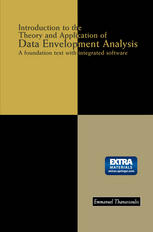

Most ebook files are in PDF format, so you can easily read them using various software such as Foxit Reader or directly on the Google Chrome browser.
Some ebook files are released by publishers in other formats such as .awz, .mobi, .epub, .fb2, etc. You may need to install specific software to read these formats on mobile/PC, such as Calibre.
Please read the tutorial at this link: https://ebookbell.com/faq
We offer FREE conversion to the popular formats you request; however, this may take some time. Therefore, right after payment, please email us, and we will try to provide the service as quickly as possible.
For some exceptional file formats or broken links (if any), please refrain from opening any disputes. Instead, email us first, and we will try to assist within a maximum of 6 hours.
EbookBell Team

0.0
0 reviews1 DATA ENVELOPMENT ANALYSIS Data Envelopment Analysis (DEA) was initially developed as a method for assessing the comparative efficiencies of organisational units such as the branches of a bank, schools, hospital departments or restaurants. The key in each case is that they perform feature which makes the units comparable the same function in terms of the kinds of resource they use and the types of output they produce. For example all bank branches to be compared would typically use staff and capital assets to effect income generating activities such as advancing loans, selling financial products and carrying out banking transactions on behalf of their clients. The efficiencies assessed in this context by DEA are intended to reflect the scope for resource conservation at the unit being assessed without detriment to its outputs, or alternatively, the scope for output augmentation without additional resources. The efficiencies assessed are comparative or relative because they reflect scope for resource conservation or output augmentation at one unit relative to other comparable benchmark units rather than in some absolute sense. We resort to relative rather than absolute efficiencies because in most practical contexts we lack sufficient information to derive the superior measures of absolute efficiency. DEA was initiated by Charnes Cooper and Rhodes in 1978 in their seminal paper Chames et al. (1978). The paper operationalised and extended by means of linear programming production economics concepts of empirical efficiency put forth some twenty years earlier by Farrell (1957).